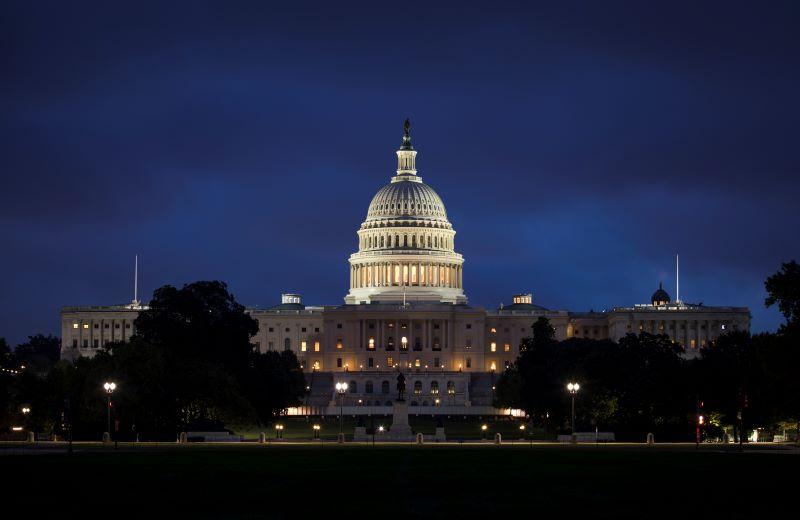
As NBAA-BACE prepares to open in Las Vegas on Oct. 22, business aviation leaders say they have a clear job ahead in the days and months leading to and following the November elections.
A new president will replace Joe Biden in the White House, and Congress will undergo significant change.
With those changes, the business aviation industry must get its message across to the new administration of the reasons why it must be promoted and not disparaged, Ed Bolen, National Business Aviation Association president and CEO told Aviation Week. The industry faces a number of other issues and challenges.
While no one yet knows whether Former President Donald Trump or Vice President Kamala Harris will become the next President, there will be a new Republican leader in the Senate as the long-serving Sen. Mitch McConnell steps down, Bolen says. On the House side, 100% of the members of the House of Representatives are up for reelection, Bolen notes. With the changes, it is up in the air who will serve as secretary of transportation.
“We don’t know if one party is going to control all three chambers; we don’t know if we’ll have a divided government and if it’s divided, we don’t know how,” Bolen said during a panel discussion at the recent JetNet Summit in New York City. It’s unknown which policies a new administration will advocate and how Congress will consider them, he says.
“But here’s what we do know,” Bolen says. “No matter who is in office, they will have the ability to impact the future of our industry. In order for us to be successful, it’s imperative that we help shape and inform their opinion and their understanding of who we are as an industry.”
That means “it’s important for us to aggressively define ourselves, tout our commitment to societal benefits, to net zero carbon emissions and provide the proof points, not just on what we say, but on what we have done for decades, over the past year, and then what we plan to do,” he says.
There are concerns with each presidential candidate, Pete Bunce, president and CEO of the General Aviation Manufacturers Association, said during the panel discussion.
A concern should Donald Trump be elected is whether he will promote what is called the “two for one,” Bunce says. “During the first Trump administration, they said, ‘For every rule you promulgate, you’ve got to get rid of two.’”
That doesn’t work in aviation, he says. Aviation needs rules.
“It’s an enabling type of system that we have that allows us to do things so we can go and certify aircraft,” Bunce says. “We can’t put new technology on things without rules that are flexible and adaptable, and that particularly impacts advanced air mobility as we start to go into that arena. So, that’s a concern to us.”
At the same time, there are concerns should Kamala Harris become president, Bunce says.
“There are significant things that we have problems with right now,” he says. “We have an FAA that quite frankly and I’ll say it, is dysfunctional. We have an FAA right now, on the cert [certification] side, where people are working from home. They are not able to support the manufacturers the way they should.”
Today, Congress has all of its attention on Boeing. And that is a problem for business aviation.
“Boeing hasn’t even been allowed to operate under the restrictions the FAA put on them after the door incident in January,” Bunce says. “It’s political hay for people to go and say, ‘Well, FAA, you don’t have enough oversight.’ The problem is it doesn’t have enough people to do that. And oh, by the way, every person they take to go into Seattle and do the oversight is one less person they have to be able to get business jets out the door. Their turn times are atrocious for issue papers and other things like that because we don’t have the experience within the FAA.”
With all the focus on Boeing, the business aviation industry must get through to Congress that “there are more companies out there in the U.S., and even those that are not headquartered in the U.S., who rely on U.S. workers being able to work, and we can’t be debilitated by all these resources going out there [to Boeing],” Bunce says.
That Boeing focus brings other ramifications.
“Each one of our companies right now are getting production audits and oversights that used to be once a year,” Bunce said.
“We’re getting four a year now, which takes down all of your people and it is a great perturbation of your abilities just to have the production line running when you have these continuous audits that don’t find anything.”
It takes both Congress and the FAA to make the system work properly, he says.
“Right now, everything is skewed out of whack, so we’re concerned about that,” Bunce says.
In the area of Advanced Air Mobility, the FAA is expected to release operational rules soon, which will allow aircraft to begin being put into service, he says. That, hopefully, will take place next year. The certification portion of the process is progressing for the two leading companies, Beta and Joby, with Archer close behind.
There are issues, however, involved in the way AAM, or eVTOL, aircraft will be viewed, Bunce says.
The U.S. has created a category of flying called Powered Lift for eVTOL aircraft. No other country has done that, he says.
“Between Europe and the U.S. now, we don’t have the regulations that mesh together,” he says. “We came up with the term ‘transferability’ that we can validate back and forth. But now we’re going to have a totally different class of pilots here in the U.S. It has no similarity with anything else on the planet.”
As an industry, “we’ve got our challenges in front of us,” Bunce says.
The upcoming year, “no matter which administration is in the White House and no matter who controls Congress, is going to be really a powerful one for us to work together and work the Hill and also be able to talk about just what our industry brings to the economies, not only here in the U.S. but all around the planet,” he says.
The time is now, Bolen says.
It is critical to use the time between now and the elections, the time between the election and the inauguration and during the first 100 days of a new administration and Congress, to meet and get business aviation’s message out, he says.
“I think it’s really important as a new administration comes in, as a new Congress comes in, using the first 100 days to make sure people know who we are and what we’re doing and why we should be promoted, not disparaged,” Bolen says. “Those are key things.”
For one, it’s important that they realize business aviation’s role as an incubator and leader in sustainable technologies, he says.
“We’re investing a huge amount in getting to net zero emissions, and we have clear pathways to achieve that,” Bolen says. “Sixty-five percent of that ability to get there is through SAF [sustainable aviation fuel], and we have been able to come a long way from when we started just seven or eight years ago doing demonstration projects out at Van Nuys Airport to say, ‘Here’s what SAF is.’ Today, every world leader knows what SAF is, and most parts of the world are developing plans to incorporate and facilitate SAF. We’re telling the world that we’re climbing, moving forward, accelerating and we’re doing it with a sense of urgency. We’re doing it fast, fostering aviation sustainability technologies. And our ability to get that message out to every member of Congress is going to be critical.”
NBAA-BACE plays an important part, he says.
“There’s nothing like the world’s largest business aviation event to bring the community together to discuss those ideas, to energize everybody, inspire everybody and help them know that the future of the industry depends on their active engagement in coordination with NBAA and our sister associations,” Bolen says.
